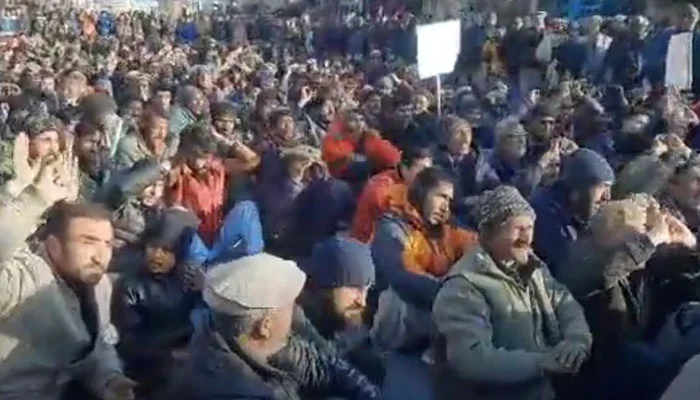Protests persist across GB against wheat price surge
SKARDU: Widespread protests have erupted in Gilgit-Baltistan (GB) following the provincial government’s decision to increase subsidised wheat prices from Rs20 to Rs36 per kg on January 1. The agitation has gained momentum, encompassing all districts, including Diamer, Gilgit, Skardu, and Ganche.
In Skardu, a 14-day protest session is underway, marked by active participation from leaders and workers of the Majlis-e-Wahdat-ul-Muslimeen. Protesters rejected the price hike and advocated for GB inclusion in Pakistan’s constitutional framework.
The public outcry extends beyond economic concerns, as demonstrators demanded representation in all constitutional institutions and strict adherence to agreements pertaining to taxation. Moreover, protesters expressed distress over local activists being included under the Anti-Terrorism Act, deeming it a severe violation of human rights.
Prominent speakers in Skardu, including Syed Qamar Abbas Al-Husaini, Sheikh Mirza Ali, Syed Agha Ali, and Ghulam Hussain Attar, accused the provincial government of targeting those advocating for the fundamental rights of GB by subjecting them to the Anti-Terrorism Act.
Addressing protests in Ganche and Skardu, the organisers accused local leaders of federal political parties of negligence and facilitating the federal government while overlooking the GB rights. Concerns were also raised about officials allegedly involved in the illegal sale of lands to non-locals.
Protesters in Hussaini Chowk of Madhopur, Kharmang, reject purchasing flour at the new prices, emphasising the federal government’s responsibility for the welfare of war-affected migrants under the Karachi agreement.
The Coordination Committee and Public Action Committee, comprising political, regional, and religious groups, have presented a consensus charter of demands. These include the immediate restoration of previous wheat prices, the development of new energy projects in the GB, establishment of educational institutions such as medical and engineering universities, especially women universities, revival of commercial routes with occupied Kashmir, and relief in air and land travel fares. The protesters stand united in their call for comprehensive changes to address both economic and constitutional grievances in the GB.
-
 Travis Kelce Plays Key Role In Taylor Swift's 'Opalite' Remix
Travis Kelce Plays Key Role In Taylor Swift's 'Opalite' Remix -
 How Jennifer Aniston's 57th Birthday Went With Boyfriend Jim Curtis
How Jennifer Aniston's 57th Birthday Went With Boyfriend Jim Curtis -
 JoJo Siwa Shares Inspiring Words With Young Changemakers
JoJo Siwa Shares Inspiring Words With Young Changemakers -
 James Van Der Beek Loved Ones Breaks Silence After Fundraiser Hits $2.2M
James Van Der Beek Loved Ones Breaks Silence After Fundraiser Hits $2.2M -
 Disney’s $336m 'Snow White' Remake Ends With $170m Box Office Loss: Report
Disney’s $336m 'Snow White' Remake Ends With $170m Box Office Loss: Report -
 Travis Kelce's Mom Donna Kelce Breaks Silence On His Retirement Plans
Travis Kelce's Mom Donna Kelce Breaks Silence On His Retirement Plans -
 Premiere Date Of 'Spider-Noir' Featuring Nicolas Cage Announced
Premiere Date Of 'Spider-Noir' Featuring Nicolas Cage Announced -
 Pedro Pascal's Sister Reveals His Reaction To Her 'The Beauty' Role
Pedro Pascal's Sister Reveals His Reaction To Her 'The Beauty' Role -
 Kate Middleton Proves She's True 'children's Princess' With THIS Move
Kate Middleton Proves She's True 'children's Princess' With THIS Move -
 Paul Anka Reveals How He Raised Son Ethan Differently From His Daughters
Paul Anka Reveals How He Raised Son Ethan Differently From His Daughters -
 'A Very Special Visitor' Meets Queen Camilla At Clarence House
'A Very Special Visitor' Meets Queen Camilla At Clarence House -
 Jodie Turner Smith Shares One Strict Rule She Follows As A Mom
Jodie Turner Smith Shares One Strict Rule She Follows As A Mom -
 Hailey Bieber Reveals KEY To Balancing Motherhood With Career
Hailey Bieber Reveals KEY To Balancing Motherhood With Career -
 Photo Of Jay-Z, Other Prominent Figures With Jeffrey Epstein Proven To Be Fake
Photo Of Jay-Z, Other Prominent Figures With Jeffrey Epstein Proven To Be Fake -
 Hillary Clinton's Munich Train Video Sparks Conspiracy Theories
Hillary Clinton's Munich Train Video Sparks Conspiracy Theories -
 Fans Slam Talk Show Host For 'cringe' Behavior In Chris Hemsworth Interview
Fans Slam Talk Show Host For 'cringe' Behavior In Chris Hemsworth Interview




